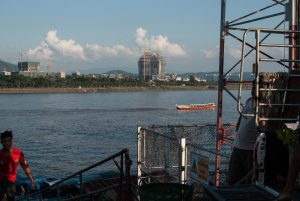A secretive, sanctioned Chinese casino mogul is looking to expand his economic empire in Laos, unfurling plans to develop tourism projects and other business ventures in remote corners of the country.
According to a report by Radio Free Asia (RFA)’s Lao service, an indispensable portal to news from the communist-ruled nation, the businessman Zhao Wei toured Saravan province in southern Laos and met with the provincial governor “to discuss the possibility of developing an airport and investing in several agricultural and tourism development projects.”
RFA quoted local officials as saying that Zhao visited tracts of land in a district on the border with Vietnam, along with land surveyors. “They conducted a survey on a stretch of land near the Lao-Vietnamese border to plant commercial trees,” one official said.
Zhao Wei is the chairman of the Kings Romans Group, which in 2007 was granted a 99-year lease over what became known as the Golden Triangle Special Economic Zone (GTSEZ), a gambling and tourism enclave in a remote pocket of the country’s northwest, close to the point where the borders of Laos, Myanmar, and Thailand converge.
Before setting up in Laos, Zhao, a businessman from China’s Heilongjiang province, is known to have once operated casinos in Macao and in Mong La, a town on the border between China’s Yunnan province and a rebel-controlled zone in Myanmar that has become notorious as a center for border-hopping Chinese gamblers.
The GTSEZ, which exists under the de facto sovereignty of Zhao and his enterprise and is dominated by soaring apartment towers and the giant golden crown of the Kings Romans Casino, has been similarly set up to attract tourists from China, where gambling is banned outside Macao.
Kings Romans has also attracted attention for its alleged immersion in a range of criminal enterprises. In January 2018, the U.S. Treasury Department imposed sanctions on Zhao and three associates for engaging in “drug trafficking, human trafficking, money laundering, bribery and wildlife trafficking, much of which is facilitated through the Kings Romans Casino.”
The sanctions have apparently done little to stem the expansion of the GTSEZ, where apartment buildings continue to rise over the Mekong. In October of last year, Zhao broke ground on the $50 million port development on a loosely-policed stretch of the Mekong upstream of the GTSEZ. One expert predicted that the new port “will mostly facilitate commerce, legal and illicit, of goods from China that will benefit Chinese commercial interests, legal and illicit, in Laos,” he said.
In addition to the possible new venture in Saravan, the RFA report notes that Zhao has also put out feelers for a number of other enterprises, including tourist attractions in Houaphanh province, a former communist base area in the northwest of Laos, and close to the Plain of Jars, a UNESCO World Heritage Site in Xieng Khouang province.
Zhao’s rise testifies to China’s expanding economic footprint in Laos, a by-product of the close economic integration between the two nations, which over the past two decades has transformed the physical landscape of the capital Vientiane and the country’s northern provinces. It also encapsulates the close relationship of Chinese businesspeople, some of questionable probity, with Laos’s ruling elite.
All of these recent reports suggests that, lubricated by the favor of a corrupt and permissive party-state, Zhao’s economic empire will continue its steady expansion into the undeveloped corners of the Lao economy.

































